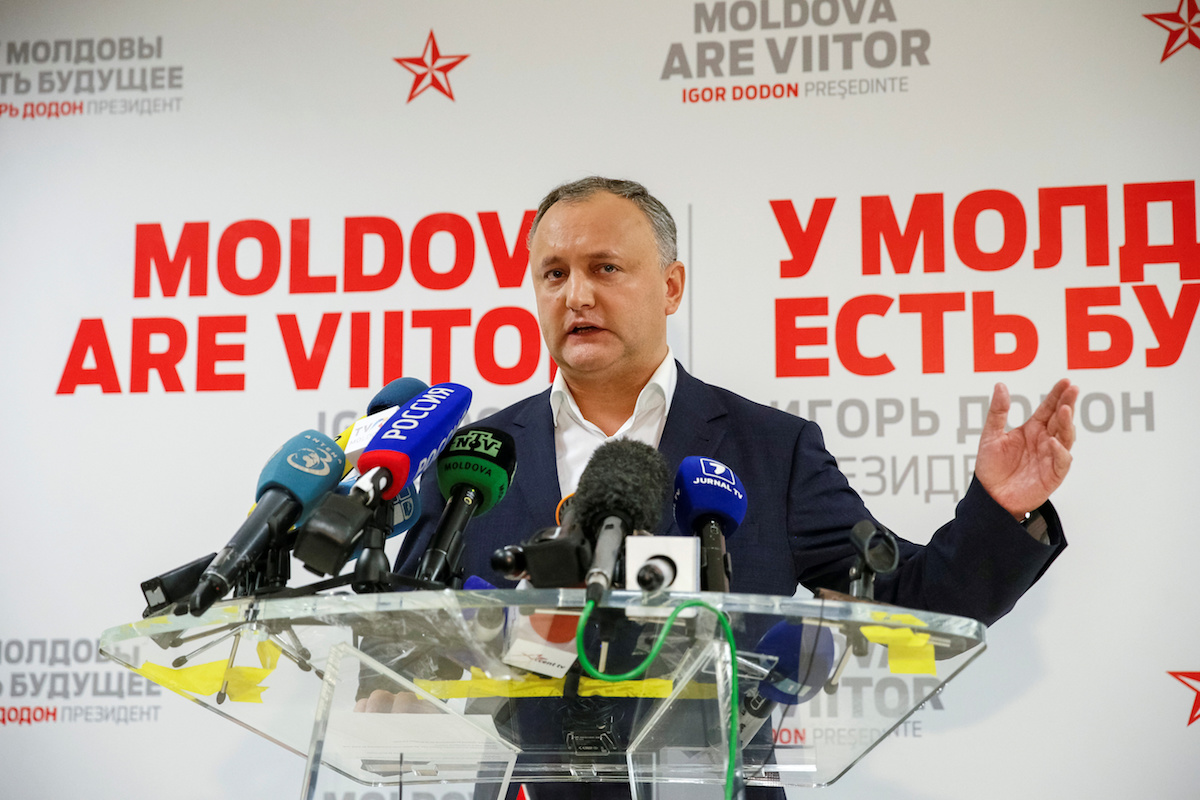Political series: Conflict between the Moldovan government and its president

Article sourced from Newsmaker
Confrontations between the pro-Russian president and the pro-European parliamentary majority has become the narrative of Moldovan political life with President Igor Dodon occasionally refusing to endorse the laws and decrees issued by the parliament and the government. Upon request of the Democratic Party, the Constitutional Court ‘cuts’ the president off from the political process with the parliamentary speaker performing the functions of the head of state whenever necessary. Three seasons of the Moldovan political series tell about how a popularly elected president has gradually turned into a decorative figure.
Season 1. The giveaway game
Public opinion polls show that President Igor Dodon is the most popular politician in Moldova. However, having assumed the president’s office Dodon eventually failed to move from the pledges of ‘fighting oligarchs’ and threats of ‘taking drastic measures’ to taking some concrete actions.
In addition, the MPs from the pro-presidential Party of Socialists of the Republic of Moldova (PSRM) (Dodon was a presidential candidate from the PSRM) have voted for the introduction of a mixed electoral system through which the Democratic Party is more likely to maintain power after the 2018 parliamentary elections.
Thereafter the president started to turn into a decorative figure. The parliamentary majority and the Democratic Party that controlled government have managed to establish a governance in the country which bypasses the head of state.
When stating the need for overcoming a political crisis, the Democrats regularly called for the Constitutional Court’s (CC) assistance. The president also appealed to the CC, though in vain.
Season 2. Supreme Commander without an army
Under the Constitution, the President of Moldova has a rather modest set of instruments with which to influence governmental decision-making. The President either doesn’t always apply the available instruments or he isn’t allowed to do so.
For example, Moldovan servicemen were involved in the Rapid Trident 2017 international military drills in Ukraine in September last year despite the ban imposed by the President who is the Supreme Commander of the country’s armed forces as prescribed by the Constitution.
Dodon argued that according to the Constitution Moldova is a neutral state and that Moldovan servicemen ‘shouldn’t participate in military exercises conducted under the aegis of any military alliance’. However, the military servicemen were dispatched to Ukraine in compliance with the government’s decree.
The whole story related to these exercises and the army defying the Supreme Commander’s order made the president look ridiculous. Dodon then signed a decree banning military servicemen’s participation in international drills without the president’s prior approval. In response to that, the leader of the Democratic Party Vladimir Plahotniuc stated that the ruling majority would put an end to the disputes over the national army’s participation in military exercises and would ensure that the army’s involvement in such events would not be dependent on the President’s approval. This is a real perspective, as the Democratic Party controls the majority in parliament.
Season 3. Rolling cut-offs
By the end of 2017, the confrontation between the president and the ruling majority grew into an unprecedented practice of temporarily ‘cutting off’ the head of state.
Under the Constitutional Court’s resolution dated 17 October the Parliamentary Speaker or the Prime Minister can temporarily assume presidential duties and sign appointment decrees whenever necessary. On 24 October, by virtue of the Constitutional Court’s resolution, Parliamentary Speaker Andiran Candu appointed Eugen Sturza (whose candidacy had previously been rejected twice by President Dodon) as the country’s defense minister without the President’s endorsement.
The Constitutional Court once again suspended the president’s powers on 2 January 2018 allowing the Parliamentary Speaker to appoint seven new members of the Cabinet (including the Vice-Premier for Reintegration and the Deputy PM for European Integration). This matter is related to the replacement of nearly half of the government’s composition. The President repeatedly rejected all the nominees, but that did not prevent the Democrats from carrying out the government reshuffle.
That wasn’t the end of the story however: On 5 January the Constitutional Court once again ‘removed’ Dodon from the political field. The Court temporarily stripped him of his presidential duties because he refused to promulgate the law prohibiting the rebroadcasting of the Russian news and information, and analytical programs in Moldova. Thus the laws adopted by parliament could now be endorsed bypassing the President.
Epilogue
It seems that this repeated narrative of the president being ‘switched off and on’ has exhausted more than just the audience. In its recent resolution dated 5 January the Constitutional Court recommended that parliament should introduce criminal liability for non-compliance with the constitutional commitments and the CC resolutions.
According to Sergiu Sârbu, an MP from the Democratic Party, such a bill has already been submitted to the Parliament.
The bill was initiated by Valeriu Ghileţchi and Iurie Leancă, MPs from the European People’s Group. Under the proposed bill any intentional non-compliance with or evasion of the court rulings or the Constitutional Court’s resolutions by a high-ranking official shall be punishable by a hefty fine or by up to three years imprisonment, with subsequent suspension of the right to hold certain posts for a period of five years.
If the bill is passed, President Dodon will not only be temporarily ‘cut off’ from the political processes, but rather be permanently kicked out.



















